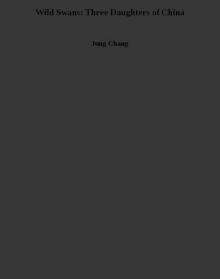Wild Swans: Three Daughters of China 

by Jung Chang
Genre: Other
Published: 2006
View: 9382
Read OnlineRead Wild Swans: Three Daughters of China Storyline:
The forces of history and the exceptional talents of this young writer combine to produce a work of nonfiction with the breadth and drama of the richest, most memorable fiction classics. Wild Swans is a landmark book, with the intimacy of memoir and the panoramic vision of a monumental human saga, which tells of the lives of Jung Chang, her mother, her grandmother, and of 20th-century China. 16-page photo insert. *** "Bursting with drama, heartbreak and horror, this extraordinary family portrait mirrors China 's century of turbulence…[Chang's] meticulous, transparent prose radiates an inner strength." Publisher's Weekly "The story reads like the sweeping family sagas of genre fiction but rises far above the norm. The characters are well drawn, the events are riveting, and the story teaches lessons of history as well as lessons of the heart. It also allows listeners to visit a world unfamiliar to most Westerners. The author brings memories of a foreign life and illuminates them with graceful prose." Jacqueline Smith, Library Journal "[This] is one of the most intimate studies of persecution, suffering, and fear in Mao's time, before and after his triumph in 1949, and one of the finest…It is the most harrowing and extended account I have read of the years between 1966 and 1976, and the most analytical." The New York Review of Books "By keeping her focus on three generations of female kin and their practical adaptations to the shifting winds of political power, Ms. Chang gives us a rare opportunity to follow the evolution of some remarkable women who not only reflected their times, but who also acted upon them in order to change their individual destiny." Susan Brownmiller, The New York Times Book Review "Despite its interesting details, Wild Swans does not tell us much that other memoirs, similarly written from a position of privilege, have not already revealed. One looks forward to an account of China 's recent past which will not merely focus on the experience of the privileged urban elite." The Times Literary Supplement "[The author] tells stories and anecdotes, in straight chronological order, with little contrivance, providing real-life fables as open-ended answers to the puzzles of 20th-century China…Taken in pieces, Chang's narrative can be prosaic. But in its entirety, the author achieves a Dickensian tone with detailed portraits and intimate remembrances, with colorful minor characters and intricate yet fascinating side plots." Time "An evocative, often astonishing view of life in a changing China." The New York Times *** Amazon.com Review In Wild Swans Jung Chang recounts the evocative, unsettling, and insistently gripping story of how three generations of women in her family fared in the political maelstrom of China during the 20th century. Chang's grandmother was a warlord's concubine. Her gently raised mother struggled with hardships in the early days of Mao's revolution and rose, like her husband, to a prominent position in the Communist Party before being denounced during the Cultural Revolution. Chang herself marched, worked, and breathed for Mao until doubt crept in over the excesses of his policies and purges. Born just a few decades apart, their lives overlap with the end of the warlords' regime and overthrow of the Japanese occupation, violent struggles between the Kuomintang and the Communists to carve up China, and, most poignant for the author, the vicious cycle of purges orchestrated by Chairman Mao that discredited and crushed millions of people, including her parents. From Publishers Weekly Bursting with drama, heartbreak and horror, this extraordinary family portrait mirrors China 's century of turbulence. Chang's grandmother, Yu-fang, had her feet bound at age two and in 1924 was sold as a concubine to Beijing 's police chief. Yu-fang escaped slavery in a brothel by fleeing her "husband" with her infant daughter, Bao Qin, Chang's mother-to-be. Growing up during Japan 's brutal occupation, free-spirited Bao Qin chose the man she would marry, a Communist Party official slavishly devoted to the revolution. In 1949, while he drove 1000 miles in a jeep to the southwestern province where they would do Mao's spadework, Bao Qin walked alongside the vehicle, sick and pregnant (she lost the child). Chang, born in 1952, saw her mother put into a detention camp in the Cultural Revolution and later "rehabilitated." Her father was denounced and publicly humiliated; his mind snapped, and he died a broken man in 1975. Working as a "barefoot doctor" with no training, Chang saw the oppressive, inhuman side of communism. She left China in 1978 and is now director of Chinese studies at London University. Her meticulous, transparent prose radiates an inner strength.Pages of Wild Swans: Three Daughters of China :